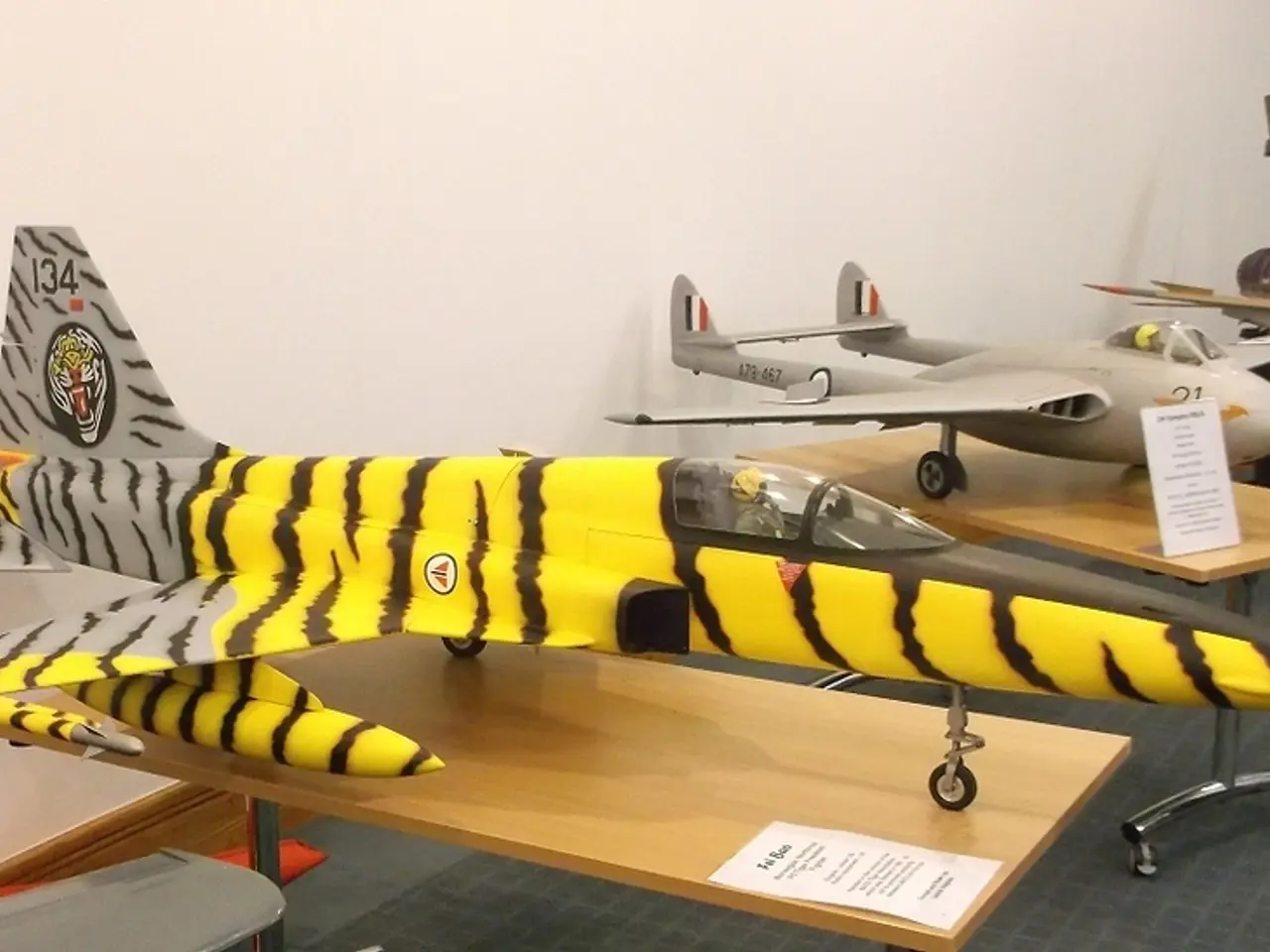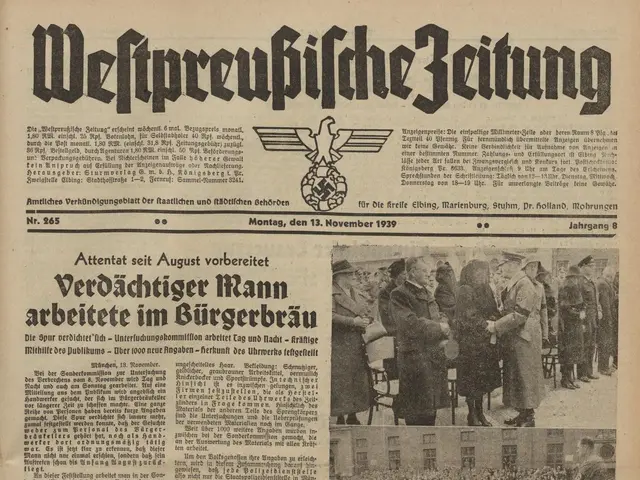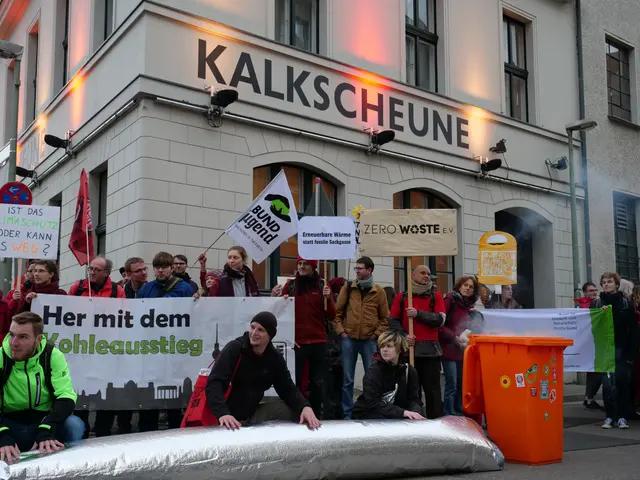Promoting Resource Efficiency: Enhancing the Recycling of Titanium and Aluminum
Airbus' Circularity Strategy Enhances Sustainable Aerospace Manufacturing
Airbus, a leading aerospace manufacturer, is making significant strides in promoting a more sustainable future by focusing on circularity for key materials like titanium and aluminium. This approach aims to reduce waste, lower emissions, and increase resource resilience in the aerospace industry.
One of the key innovations is the use of additive layer manufacturing (ALM) to produce aircraft parts. This technology, which includes processes like powder bed fusion (PBF) and directed-energy deposition (DED), allows Airbus to create parts with minimal waste, resulting in weight savings. For instance, the A350 door latch shaft is now an integrated part, weighing 45% less than traditional forging processes, resulting in a weight savings of over four kilograms per aircraft[1].
Closing the loop is another crucial aspect of Airbus' circularity strategy. The company aims for a near-complete closed-loop system where 100% of materials in an aircraft’s value chain are recycled or reused within the aerospace industry[1]. This ambition is being pursued through partnerships like EcoTitanium, a venture that includes Aubert & Duval, a French metal producer, and other partners, to develop ecological recycling methods[1].
Airbus is also collaborating with companies like Tarmac Aerosave, a joint venture with Safran and Suez, to recycle fuselages into new aluminium alloys that meet aerospace manufacturing specifications[1]. Five Airbus sites are part of an initial pilot that aims to improve traceability of aluminium scrap and develop a standard calculation for determining the ratio of recycled content[1].
In addition, Airbus has teamed up with aluminium producers Constellium and Novelis to establish closed loop recycling of aluminium production scrap[1]. Similarly, Airbus is recycling titanium production floor scraps by partnering with companies like EcoTitanium to process the scraps into new ingots for manufacturing[1].
The ingot produced by EcoTitanium will be used by metals specialist Aubert & Duval to manufacture new titanium-forged airframe parts[1]. This is a significant step as EcoTitanium is the first venture in Europe to offer recycled aerospace-grade titanium, with the potential to produce up to 75%-recycled titanium ingots[1].
Airbus' circularity efforts extend beyond its own operations. VAS Aero Services, a subsidiary of an Airbus-owned company called Satair, offers an end-of-life dismantling programme for aircraft parts, recovering anywhere from 300 to 6,000 parts for resale[1].
This commitment to circularity is part of Airbus’ broader ambition to pioneer sustainable aerospace. By focusing on intelligent design, resource optimization, advanced ecological recycling technologies, and strategic partnerships, Airbus is not only reducing waste and environmental impact but also supporting long-term resource resilience in aerospace manufacturing[1].
References:
[1] Airbus (2023). Airbus' circularity strategy. Retrieved from https://www.airbus.com/company/innovation/circular-economy.html
[2] EcoTitanium (2023). About EcoTitanium. Retrieved from https://www.ecotitanium.fr/en/ecotitanium/
[3] Constellium (2023). Constellium and Airbus extend partnership to recycle aircraft aluminum. Retrieved from https://www.constellium.com/news/press-releases/constellium-and-airbus-extend-partnership-to-recycle-aircraft-aluminum/
[4] Tarmac Aerosave (2023). Recycling. Retrieved from https://www.tarmac-aerosave.com/en/services/recycling/
[5] VAS Aero Services (2023). End-of-life solutions. Retrieved from https://www.vasaero.com/en/end-of-life-solutions/
- Airbus, a prominent figure in the aerospace industry, is spearheading a sustainable future with its Circularity Strategy, focusing on key materials like titanium and aluminum.
- One innovation is additive layer manufacturing (ALM), used by Airbus to produce aircraft parts like the A350 door latch shaft, resulting in weight savings of several kilograms per aircraft.
- The company aims for a closed-loop system where 100% of materials in an aircraft’s value chain are recycled or reused within the aerospace industry, such as through partnerships like EcoTitanium.
- Airbus collaborates with companies like Tarmac Aerosave to recycle fuselages into new aluminum alloys, and with Constellium and Novelis for closed loop recycling of aluminum production scrap.
- Similarly, Airbus recycles titanium production floor scraps, partnering with EcoTitanium to process them into new ingots, marking a first in Europe to offer recycled aerospace-grade titanium.
- The ingot produced by EcoTitanium will be used by Aubert & Duval to manufacture new titanium-forged airframe parts.
- VAS Aero Services, a subsidiary of an Airbus-owned company, offers an end-of-life dismantling programme for aircraft parts, recovering several thousand parts for resale.
- Airbus' commitment to circularity extends beyond its own operations, supporting the aerospace industry's long-term resource resilience through intelligent design, ecological recycling technologies, and strategic partnerships.








